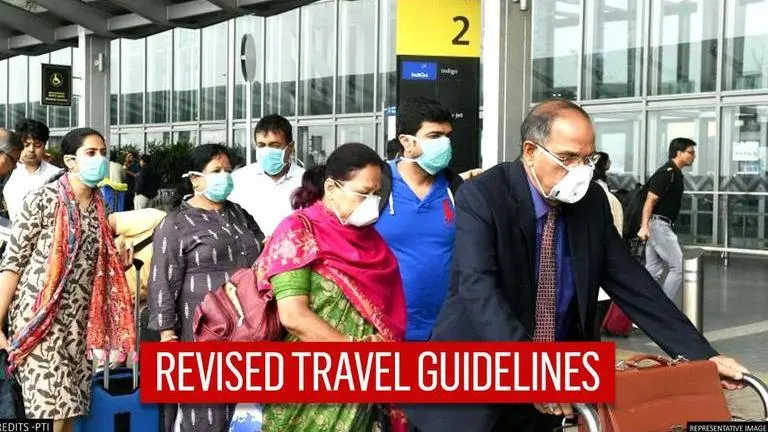Updated 24 February 2021 at 23:19 IST
As COVID-19 cases surge, here are the revised travel guidelines imposed by several states
The staggering rise in number of COVID cases has forced several state governments to impose sudden restrictions in a bid to control the spread of the virus.
- India News
- 5 min read

With the active caseload of COVID-19 witnessing a rise, there have been signs of a second wave of the Coronavirus across India despite the country inching closer to completion of the phase-1 of vaccine inoculation. The staggering rise in the number of cases has forced several state governments to impose sudden restrictions in a bid to control the spread of the virus. This comes amidst the emergence of the two new virus strains in three states - Maharashtra, Kerala and Telangana. However, it has not been confirmed if there is a direct correlation between the increase in cases and the new strains which has been witnessed in addition to the other strains from UK, South Africa and Brazil.
Following the surge in COVID-19 cases, here are revised guidelines put to effect in respective states:
Maharashtra COVID guidelines
While night curfews have been imposed to curb the virus spread in Maharashtra - which has been one of the worst-affected states since the outbreak - there has also been a change in the travel guidelines. In addition to the mandatory 7-day institutional quarantine for international passengers, all domestic passengers arriving from Delhi, Rajasthan, Gujarat, Goa and Kerala are required to carry a mandatory RT-PCR negative test report conducted 72 hours before. Those who fail to provide RT-PCR report will have to undergo the test at the Mumbai airport at their own cost.
Passengers would be charged Rs. 850 for the test. Test results will take up to 24-48 hours for arriving passengers and 8-10 hours for departing passengers and will be sent via email. Those who test positive will be sent to institutional quarantines whereas asymptomatic passengers will have to undergo 14 days of home quarantine.
Advertisement
Delhi COVID guidelines
Unlike Maharashtra, Delhi has been successful in controlling the virus spread to an extent that has been highlighted by the closure of Sardar Patel COVID Care Centre. Hence, passengers arriving in the national capital need not produce a negative RT-PCR COVID-19 report and will only be screened thermally. In case of passengers arriving from Karnataka, Odisha, and Kerala, all asymptomatic passengers will undergo home quarantine.
Kerala COVID guidelines
In Kerala, COVID-19 tests would be conducted for only those experiencing symptoms of the disease while thermal screening would be mandatorily done for all. Those visiting the southern state for a short duration time for purposes like business, official, trade, etc will be exempted from any quarantine whereas domestic passengers will have to undergo a mandatory home quarantine of 14 days. The state administration has allowed passengers visiting for business purposes and other short-duration visitors to stay in the state for upto 7 days after obtaining entry passes through the Covid19jagratha portal. Those seeking entry pass will have to provide their local itinerary along with the purpose of visit and local accommodation and contact person.
Advertisement
Karnataka COVID guidelines
The Karnataka government has made it compulsory for passengers arriving from Kerala and Maharashtra to carry a COVID-19 negative report from an ICMR approved lab conducted 72 hours before the arrival.
West Bengal COVID guidelines
Wary of the surge in Maharashtra and Kerala, the West Bengal administration seeks a COVID-19 negative report from passengers arriving in the state. Apart from undergoing thermal screening at the airport facility, all domestic passengers will have to ill up and submit the declaration form using the Sandhane App developed by the Home and Family Welfare Department of West Bengal. Symptomatic passengers would be taken to the nearest facility for the COVID-19 test while asymptomatic passengers have been advised a minimum of 14-days of self-monitoring. For symptomatic passengers, health authorities would decide the quarantine requirement on a case-to-case basis.
Tamil Nadu COVID guidelines
On arrival in Tamil Nadu, passengers will have to undergo thermal screening while COVID testing would be done for only symptomatic persons coming from other states/UT/countries. Testing is not mandatory for passengers arriving from other airports in the state itself. Those who test positive on arrival would be sent to hospital isolation whereas asymptomatic patients would be required to undergo 11-day home quarantine. Business travellers visiting Tamil Nadu for a short stay of 72 hours are exempt from home quarantine norms. In such cases, the individual needs to furnish a valid return document.
Phase 2 of COVID vaccination from March 1
On Wednesday, the Union Cabinet approved the next phase of COVID-19 vaccination which will commence from March 1 onwards. Addressing a press conference, Union I&B Minister Prakash Javadekar stated that people above 60 years of age and those aged above 45 years having comorbidities can get vaccinated in this phase. Most importantly, the vaccination will take place at not only 10,000 government facilities but also 20,000 private hospitals for the first time.
While the government hospitals will administer the vaccine free of cost, private facilities will charge for inoculation. The amount for the same will be decided by the Health Ministry within 3-4 days. In the initial phase, only healthcare and frontline workers were vaccinated at government facilities.
Published By : Jitesh Vachhatani
Published On: 24 February 2021 at 23:19 IST
